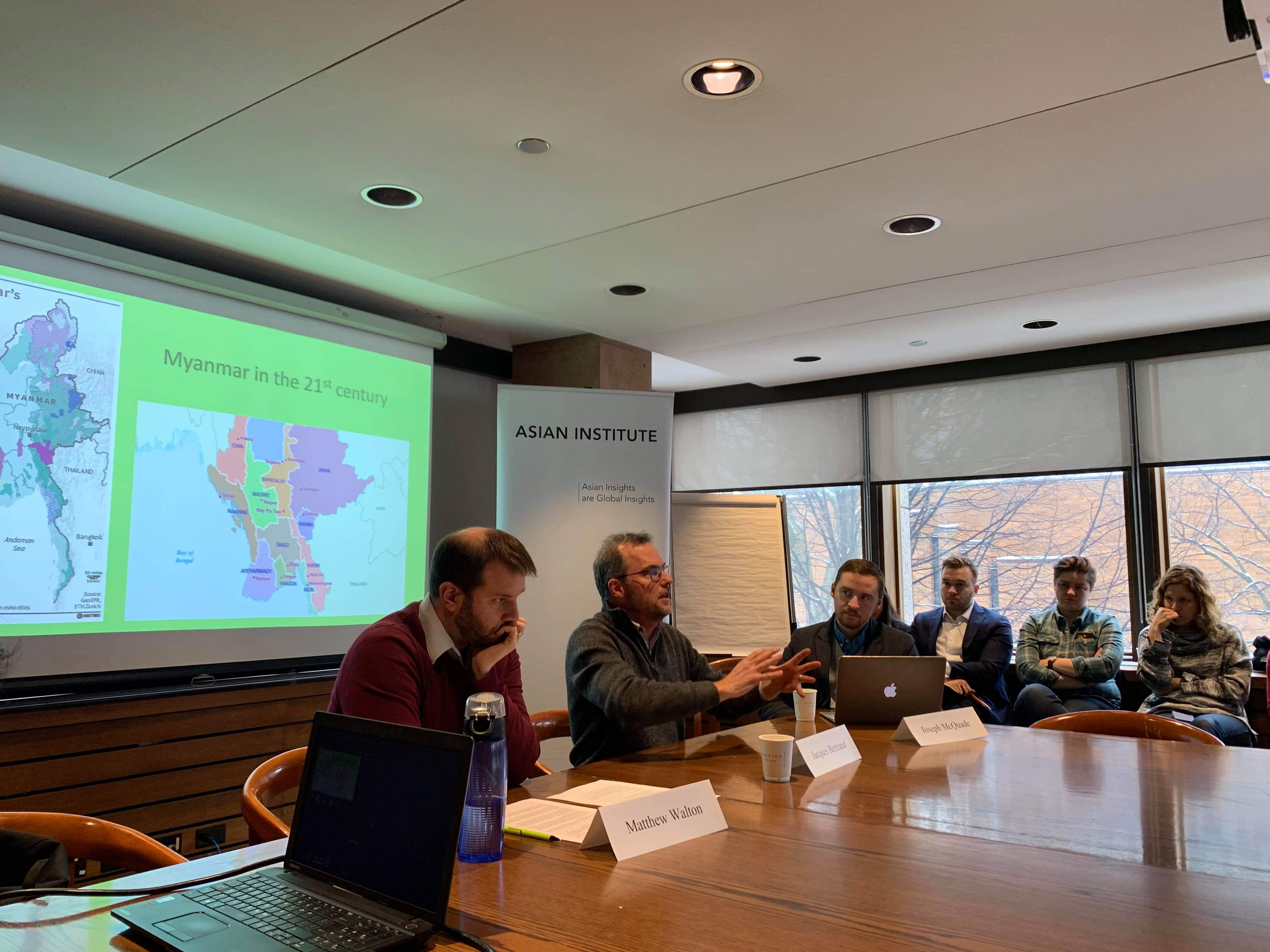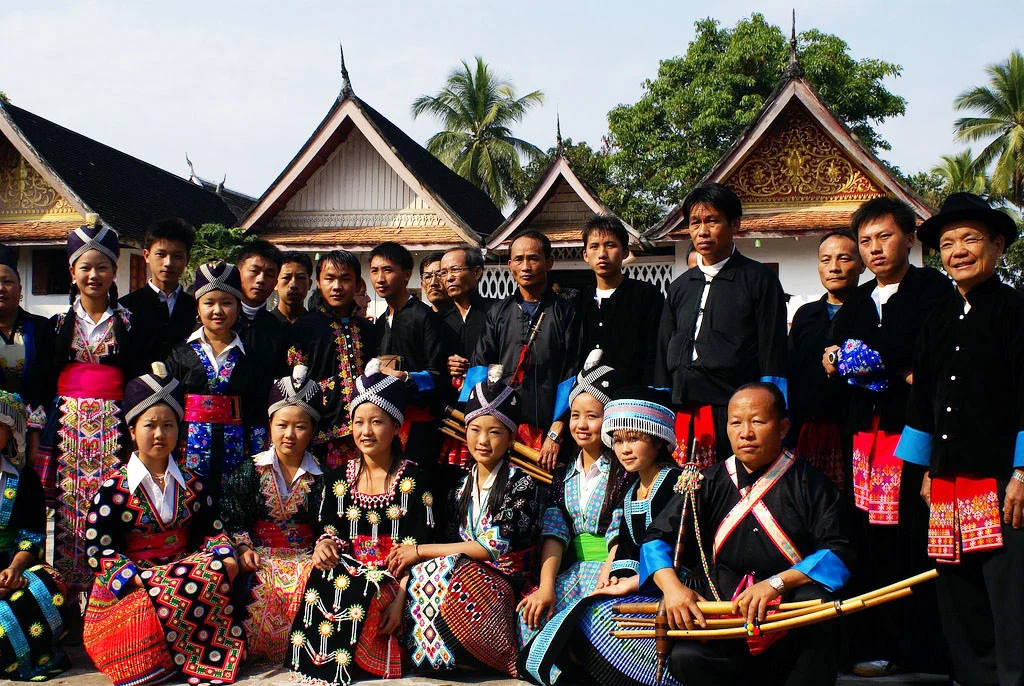On February 6th, the Synergy Journal of Contemporary Asian Studies and the Contemporary Asian Studies Students’ Union (CASSU) hosted the panel discussion “Democracy in Myanmar: What to Watch for in 2020”. The conversation featured Dr. Jacques Bertrand and Dr. Matthew J. Walton, with Dr. Joseph McQuade acting as the moderator. The panel was structured as a formal Q&A, such that the speakers could introduce the topic and relevant issues associated with it, before an open question period allowed audience members ranging from students to members of the community to participate in the discussion.
All panellists are active scholars at the University of Toronto. The moderator, Dr. McQuade, is the Richard Charles Lee Postdoctoral Fellow at the Asian Institute at the Munk School and a former SSHRC Postdoctoral fellow at the Centre for South Asian Studies. Dr. Bertrand is a Professor and Associate Chair (Graduate) of Political Science as well as the Director of the Collaborative Master’s Program in Contemporary East and Southeast Asian Studies at the Munk School. He is currently finalising a book with Ardeth Thawnghmung and Alexandre Pelletier, entitled Winning by Process: The State, Democratic Transition, and Ethnic Conflict in Myanmar. Dr. Walton is an Assistant Professor in Comparative Political Theory and was the honorary guest speaker as he was previously the inaugural Aung San Suu Kyi Senior Research Fellow in Modern Burmese Studies at St. Antony’s College, University of Oxford.
The event began with introductory remarks from Mia Nguyen, the President of CASSU, and Hui Wen Zheng, the Editor-in-Chief of Synergy. They highlighted the relevancy of studying Myanmar (formerly known as Burma) considering the Rohingya crisis, which has cast scrutiny on the domestic changes the country is undergoing from military dictatorship to democracy. Given that Myanmar is expected to hold a national election this year, these considerations to its political institutions and history provides grounds to make projections for the future as international audiences attempt to make sense of the domestic affairs occurring in the Southeast Asian state.
To give the audience context to the issues at hand, McQuade first gave a brief presentation of the history of Myanmar. Prior to its creation as an independent nation-state in 1948, Burma was subject to colonisation by both the British and the Japanese. The legacy of these historical events can be observed in the way that power has manifested in Myanmar—such that there exists a tension within its multiculturalism as well as between its political institutions.
In order to understand the circumstances of Burmese politics, its demographics must first be analysed. There are seven states, designated with the name of the ethnic majority population of the state, and seven regions, with ethnic Burma majorities. Some of these ethnic states may be characterised by “ceasefire capitalism”. Originally coined by geographer Kevin Woods, Walton introduced this concept to the audience to explain how the military and private economic interests of the state have benefitted from strategic ceasefires with ethnic groups. What is important to note, however, is that agreements with different states entail different dynamics of peace. Bertrand revealed that ethnicity has been an important notion within the state since the conception of Burma. Having an ethnically diverse population, the recognition of peoples within the state has implications for who can receive privileges afforded to citizens. As evidenced by the Rohingya crisis, Walton noted that this identification process is not so clear-cut. The effects of British colonisation mean that colonial-era records enumerated Muslim populations with different titles, allowing the contemporary Burmese state to claim (inaccurately) that Rohingya are illegal immigrants allowed in by the British. Thus, they are not deserving of citizenship. This prompted the questions from McQuade of who the Rohingya are, and why they are being singled out now.
The panel shared that the Rohingya people are an ethnic group who predominantly practise Islam and reside in Myanmar’s Rakhine State. Since 2016, they have been subject to heightened persecution and violence from Buddhist communities and the military. However, they have been the targets of military violence since the 1970s. As such, the recent stripping of citizenship is part of a broader system of discrimination. The increase in violence has brought about a positive slew of support for the military domestically at a time where some groups are losing patience with democratisation. Both Walton and Bertrand approach this problem as one of politicisation. Walton draws connections between anti-Muslim sentiments in Myanmar to those occurring elsewhere. Particularly, he states, the influence and legitimation of the post-9/11 Global War on Terror discourse has allowed violence against the Rohingya to proliferate. Adding on to this, Bertrand spoke about threat creation through factors such as ideology and education. This has created widespread suspicion of borders, which has fueled the perception of the Rohingya as a threat by those “trained to be xenophobic.” It is in this context that the symbolic significance of ethnic recognition impacts the quality of Burmese democracy.
Myanmar is in an active process of transitioning into a democracy. Bertrand stated that while there was no pressing need for Myanmar to democratise, an internal realisation by the military regime having low access to economic opportunity was self-harming motivated the move. As such, there has been a limited degree of democratic progress as the civilian government must exist alongside military rulers. The military was responsible for formulating the current constitution, which has resulted in a tug-and-pull relationship between the two ruling groups.
A key actor in this transition is Aung San Suu Kyi—the State Counsellor and de facto leader of Myanmar. She is the daughter of the former General Aung San who helped in establishing independence for the country. While she is a Nobel Peace Prize laureate and is considered to have played a vital role in the state’s democratic transition, Aung San Suu Kyi has gained criticism internationally for allowing the Rohingya crisis to persist. Upon analysis, however, it appears that her character is consistent with the rational-actor analysis. Walton argued in support of this claim with reference to her personal worldview coming from a privileged background and anti-Rohingya sentiments of the Burmese. There is little domestic support for the Rohingya, and the ethnic cleansing may be interpreted as a callous sacrifice for democratic progress. Of course, such a sacrifice exists in stark opposition to traditional democratic principles.
One last element of the Rohingya crisis considered by the panel was the role of social media. Although both Walton and Bertrand supported each other’s claims thus far, they slightly differed in opinions about how this technology has affected domestic reactions. Walton saw social media as a tool of “pushing back” and suggests that the Burmese are now able to fact check through their increasing digital literacy. This is reinforced by local civil society groups that have been applying pressure to third parties such as Facebook to flag hate speech. On the other hand, Bertrand cast doubt on the educational distribution amongst the population, as misinformation has historically been used to strip the Rohingya of rights.
A key theme that emerged from this discussion was the complexity of domestic affairs in Myanmar due to its history of colonialism and dynamics between ethnic minorities, who exist within a politics of recognition. Throughout the discussion, the panel members acknowledged the limitations of this discussion as each sub-topic could even be further explored on its own. Bertrand stressed that resolution to the current issues in Myanmar requires meaningful political development. Drawing on current trends, Bertrand suggests that the upcoming elections in Myanmar could be crucial to the development of peace because it serves as an opportunity to gain political leverage against the military. Moving forward, all eyes will be on Myanmar as it moves into a new stage of democratization led by Aung San Suu Kyi.
Yun Wen Siow is the Lead Editor of the Southeast Asia Section.








